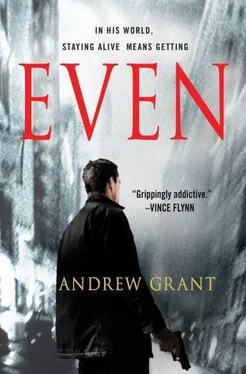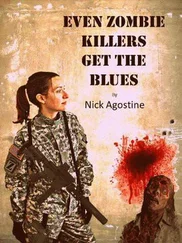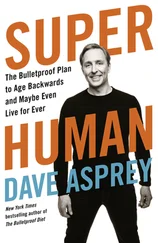Andrew Grant - Even
Здесь есть возможность читать онлайн «Andrew Grant - Even» весь текст электронной книги совершенно бесплатно (целиком полную версию без сокращений). В некоторых случаях можно слушать аудио, скачать через торрент в формате fb2 и присутствует краткое содержание. Жанр: Триллер, на английском языке. Описание произведения, (предисловие) а так же отзывы посетителей доступны на портале библиотеки ЛибКат.
- Название:Even
- Автор:
- Жанр:
- Год:неизвестен
- ISBN:нет данных
- Рейтинг книги:5 / 5. Голосов: 1
-
Избранное:Добавить в избранное
- Отзывы:
-
Ваша оценка:
- 100
- 1
- 2
- 3
- 4
- 5
Even: краткое содержание, описание и аннотация
Предлагаем к чтению аннотацию, описание, краткое содержание или предисловие (зависит от того, что написал сам автор книги «Even»). Если вы не нашли необходимую информацию о книге — напишите в комментариях, мы постараемся отыскать её.
Even — читать онлайн бесплатно полную книгу (весь текст) целиком
Ниже представлен текст книги, разбитый по страницам. Система сохранения места последней прочитанной страницы, позволяет с удобством читать онлайн бесплатно книгу «Even», без необходимости каждый раз заново искать на чём Вы остановились. Поставьте закладку, и сможете в любой момент перейти на страницу, на которой закончили чтение.
Интервал:
Закладка:
“He did. But no explosive. And he said miniature. Focus on that.”
“Prepacked explosive, so no trace. And powerful, so small size.”
“No. Something else altogether.”
“Maher’s people are on this, you know. They’re the best. And they’re thinking there must be a large number of devices. Each one too small to do much harm on its own. But coordinated, so that together they could take down a power grid, say. Or a telecom network. Or the water supply. It’s a recipe for maximum chaos.”
“No. Look at what they had at the clinics. The drug. Remote triggers. And one other thing. Something unique to them.”
“What?”
“Access to the inside of people’s bodies. It wasn’t just ripped-off organs they were putting back in there.”
“They planted bombs inside people? You’re crazy.”
“Not bombs. Devices for releasing the drug. They put them in during the operation, alongside the new organ. They lie dormant till a signal triggers them. Then a whole vial’s worth of the drug gets dumped directly into the bloodstream. And you know what happens next. Ten pints of the red stuff pours straight out through the poor bastard’s skin, like water through tissue paper.”
“Is that even possible?”
“I’ve heard of similar things, for cancer and diabetes.”
“Using mechanical devices? With remote control? Nationwide?”
“Not so far. They’ve used polymers, up to now. For gradual diffusion.”
“Any proof they’ve made the leap?”
“It’s the only thing that makes sense.”
“I don’t know. It doesn’t tally with the video.”
“It does. They said people would drown in their own blood. And you saw Taylor.”
“Taylor didn’t drown.”
“Not literally. But you get the picture.”
“I still don’t buy it. Think of the resources you’d need.”
“You’ve seen the drug they developed. That shows a high degree of competence in itself. And the guys they brought over were transplant surgeons. Implanting things in people is their day job.”
“It still seems like-”
“Lavine, stop talking. You believe me, or you don’t. You save these people, or you don’t. Either way, I don’t care. I don’t know them. I’m not interested in them. Stay in D.C. Look for your nonexistent bombs. Knock yourself out. Just call me when you have news about Tanya.”
THIRTY-SIX
There was a moment when I thought my career in the navy was over before it even began. It was at the end of the first exercise I’d been sent on, away from barracks. I was sitting in the course supervisor’s office with two other people. My training officer, who’d been summoned especially for the meeting, and the psychologist who’d been observing me for the previous two days. I remember looking at their faces and thinking that absolutely nothing good was about to happen.
The course had been all about teamwork. There were thirty-two other people in the group. They were all up for jobs in the civil service. The Home Office, Inland Revenue, Employment Service, that kind of thing. All their written exams were out of the way. Now they just had to show how well they could work together. It was the final hurdle for them. It felt like the final straw for me.
We had to sit through two full days of role plays and discussions and debates. Your plane has crashed in the jungle. What should you do? Your ship is sinking. Which two people should you save? You have to market a new soft toy. What kind should it be? And if that wasn’t painful enough, they forced a group feedback session on us between each exercise. How fully did you involve the quieter members of the group? How do you feel about the inclusiveness of your performance? How could you encourage everyone to contribute more actively?
At least there was no hugging.
The psychologist’s verdict wasn’t complimentary. He left no room for misunderstanding about that. Every word he uttered for half an hour was carefully chosen to show exactly how badly he thought of me. By the time he left the room I was half expecting to be arrested as a menace to society. But when the door closed behind him my training officer’s stern face broke into a huge smile. He roared with laughter. And then he took me for a drink.
The navy works in strange ways. I know that now. But at the time I had no idea what the assessors had been told. They thought they had to rubber-stamp me for a staff role. Not out of mischief. But because people are naturally inclined to give you the answer they think you want. They have to be really certain of themselves to dig in and contradict you. Especially when you’re paying their wages. So with a lot of external tests, the navy runs things backward. You have to fail to pass. And that one I failed with flying colors.
So in the end, whether he meant to or not, the psychologist did me a favor. A huge one. He opened the door for me to work on my own. That freed me from depending on other people to make progress. And from feeling responsible for what happened to anyone else.
Until Tanya went missing, anyway.
Then I was back to doing both.
The night doorman at Tanya’s building rolled over the minute he saw my consulate ID. He gave up her spare keys immediately. He didn’t even ask me to move my fingers away from the expiration date at the bottom of the pass. Which was lucky, since it had run out at midnight on Sunday.
I saw no one in the corridors or elevators on my way up to Tanya’s floor. And no sign of the police doing any canvassing. Maybe they’d already finished, and found nothing. Or maybe they hadn’t started yet. Either way, I wasn’t encouraged.
There was a fresh scratch in the gray paint around the lock on Tanya’s door. It was half an inch long and roughly curved, as if someone had been careless with their key. I couldn’t say it was significant. But equally, I couldn’t rule it out. Tanya could have done it herself. Or the previous resident. Or the kidnappers. Or even the police. Without equipment and people and time to run tests, there was just no way of knowing.
I’ve lost count of the number of offices and houses and flats I’ve rifled through in my career. I’d lost count before the end of my first year. It’s the kind of thing that feels alien the first few times but quickly becomes tediously routine. The fear of being disturbed or leaving some telltale sign of your presence soon passes, and instinct and training take over. You learn to anticipate the likely places where people try to conceal things, thinking they’re clever. Mundane, scattered items form patterns before your eyes, revealing your suspect’s true character and habits. Normally I wouldn’t turn a hair, walking in uninvited through someone’s front door while they were out. But stepping into Tanya’s apartment felt very different. Partly because what I was searching for was so intangible-signs of who had ambushed her and where they might have gone after the clinic-but mostly because this time the job wasn’t professional.
It was personal.
Tanya had only been at that address for five days and she’d hardly had time to scratch the surface of making it her home. The kitchen drawers and cupboards were empty except for one box of imported tea bags. A carton of milk stood on its own in the cavernous fridge. Two takeaway Thai food containers lay in the trash, accompanied by plastic cutlery and a couple of diet Coke cans. Five heavy cardboard boxes were lined up against a pair of bookshelves in the main room. They were still sealed up with wide strips of packing tape. There was no sofa. No chairs. No TV or stereo. No pictures on the walls or blinds at the windows. But more unhelpfully, no signs of a struggle. No cryptic messages. And nothing left for me to interpret or decode.
Читать дальшеИнтервал:
Закладка:
Похожие книги на «Even»
Представляем Вашему вниманию похожие книги на «Even» списком для выбора. Мы отобрали схожую по названию и смыслу литературу в надежде предоставить читателям больше вариантов отыскать новые, интересные, ещё непрочитанные произведения.
Обсуждение, отзывы о книге «Even» и просто собственные мнения читателей. Оставьте ваши комментарии, напишите, что Вы думаете о произведении, его смысле или главных героях. Укажите что конкретно понравилось, а что нет, и почему Вы так считаете.












